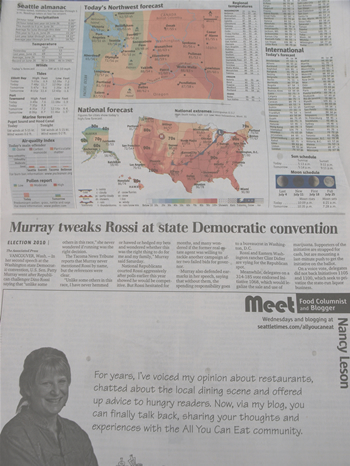We're all doomed! Or are we?
We’ve got the climate crisis to combat, yet haven’t made the headway we need to on alternative energy. The more we learn about British Petroleum’s unchecked subsea oil gusher, the worse the environmental damage looks.
Krugman finally said the “d-word” in his column for the New York Times, suggesting that what we’re really in is a depression, not just a recession.
Politicians left and right — no pun intended — seem wholly in the grip of corporations, preventing us from making even the most obvious and necessary of progress in foreign policy, health care, financial reform, environmental protection, economic recovery... the list goes on.
Indeed, it’s impossible to stay informed as a responsible citizen should without feeling doomed by it all. The problems are so many, and every one of them so large, it seems impossible to even think about making headway on any of it.
It’s a problem because I don’t like feeling doomed.
Quite the opposite, actually. Which is why I am so encouraged whenever I see anything that hints that maybe we’re not doomed.
And while I can’t say that I feel particularly good about the nation’s or the world’s short term prognosis, thanks to the good folks at TED, at least today I’m feeling better about the long term prognosis.
In the past couple of days, TED.com featured a couple of videos that did a lot to lift my optimism meter up a few notches.
They’re still available for anyone who could use a lift.
One is by Ellen Dunham-Jones, on the subject of “retrofitting suburbia.” She talked about a movement that is slowly gaining steam to renovate dead and dying suburban spaces into newly urbanized ones, and the many benefits this brings.
Did you know that the carbon footprint of a suburban dweller is about three times higher than that of a city dweller? I didn’t. It’s counterintuitive, but watch the video for the explanation of how one of the best things we could do both for the environment and for people’s quality of life is to urbanize the suburban sprawl: Retrofit it for higher density, mixed-use living.
She makes a lot of sense, and I have to say, I’d like to live in a city that’s like her conception of the future for Atlanta, Georgia.
The other was by Clay Shirkey, on the subject of “cognitive surplus,” which is his fancy term for what we do with our brains when we’re just fooling around on the web. He gave a rather remarkable statistic: humanity has over one trillion hours of cognitive surplus, per year, at its disposal for doing something useful with. And through a fairly compelling set of examples, he shows how the nature of the modern internet allows and even encourages people to use their cognitive surplus in the creation of things that benefit society at large.
These two items may seem like they have nothing to do with each other, but I don’t think that’s true, and the similarities are what encourages me so much about the long term future.
The suburban retrofitting movement and Shirkey’s cognitive surplus benefits are both excellent examples of larger trends which are pushing society away from what got us in trouble in the first place.
The 20th century, for all the truly wonderful advances it brought to humanity, was still dominated in large part by an ultimately self-destructive mind set. The 20th century mindset was an ultimately extractive, selfish one. It was short sighted, and concerned primarily with the direct consequences of economic activity.
For much of the twentieth century, nobody cared about burning fossil fuels, because the worldwide consequences of doing so were so indirect, so far down the road, as to be invisible and thus not worthy of concern.
In the twentieth century, there was still enough remote and undeveloped land that industrial corporations could get away with dumping or burying their toxic waste rather than dealing with it properly. Again, out of sight, out of mind. In the twentieth century, all that mattered was finding a way to extract something of value from the world to generate a profit for yourself: take what you can get your hands on, and externalize the true costs of your activities wherever possible.
But the deeper forces giving rise to suburban retrofitting and using our free time for social good on the web are themselves acting in exactly the opposite direction. Those forces are pushing society towards generosity, rather than selfishness. Those forces are pushing us towards deep systemic thinking about the long term consequences of different choices we (either individually or collectively) can make.
The technologies of the web, in the way they empower individuals to create, share, participate, and be heard, and social movements like urban retrofitting, the return of farmers markets, and many others are, together, creating a new generation of people who are being raised to think generously rather than selfishly. To think collectively, rather than individually. To think about the whole system, rather than on just the part that is immediately visible.
Perhaps not surprisingly, the difference between the old, 20th century ways of thinking and the new, twenty-first century ones is at heart the difference between political conservatives and progressives.
If you look at the conservative movement in America today, through its expression in the modern Republican Party, what you see is an unabashed pursuit of twentieth century thinking: deregulate and give big business an unfettered hand so it can pursue extractive profits while burdening the rest of us with the full costs of how those profits were obtained.
The progressive movement in America today (which I wish I could say was actually in control of the modern Democratic Party), is exactly the other way around. We favor twenty-first century thinking — long-term, systemic, and collectively generous — at every turn.
It will, sadly, take time for the youth who are being raised in this new way of thinking to grow up and take the reins of power. Until they do, things are going to be pretty rough. But ultimately, they will grow up, and they will take power. And if we who are older and have power now can’t get the job done sooner, at least then a new generation who has the skills to fix things will at last have the power to do so.
The near future still doesn’t look good. I still feel pretty doomed for myself, and I don’t like that feeling. But at least when I see people like Clay Shirkey and Ellen Dunham-Jones pointing the way by which Gen-Y can lead humanity back out of the abyss, I don’t feel so doomed for my kids’ futures.

 The eight paragraphs only mention that Murray "tweaked" Rossi in her speech, and that delegates endorsed yes on Initiative 1068 and no on Initiatives 1100 and 1105. That was it. No mention of the speeches by Tim Kaine, Suzan DelBene, Denny Heck, Jay Clough, or Clyde Cordero.
The eight paragraphs only mention that Murray "tweaked" Rossi in her speech, and that delegates endorsed yes on Initiative 1068 and no on Initiatives 1100 and 1105. That was it. No mention of the speeches by Tim Kaine, Suzan DelBene, Denny Heck, Jay Clough, or Clyde Cordero. 